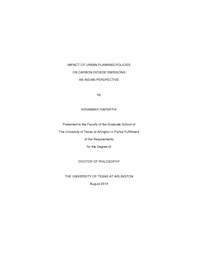
ATTENTION: The works hosted here are being migrated to a new repository that will consolidate resources, improve discoverability, and better show UTA's research impact on the global community. We will update authors as the migration progresses. Please see MavMatrix for more information.
Show simple item record
| dc.contributor.author | Raparthi, Kiranmayi | en_US |
| dc.date.accessioned | 2014-09-17T17:29:19Z | |
| dc.date.available | 2014-09-17T17:29:19Z | |
| dc.date.issued | 2014-09-17 | |
| dc.date.submitted | January 2014 | en_US |
| dc.identifier.other | DISS-12778 | en_US |
| dc.identifier.uri | http://hdl.handle.net/10106/24723 | |
| dc.description.abstract | Climate change is a multidimensional observable fact and is regarded as one of the greatest challenge human society is facing in the 21st century. Debates on climate change advocate that, urban areas not only contribute to climate change by emitting huge amounts of carbon-dioxide (CO₂) gas into the atmosphere, but also play a vital role in addressing climate change. International negotiations highlight the need to respond to climate change by mainstreaming climate change mitigation in urban planning however these have remained research rhetoric. One reason for this gap between research and planning practice may be due to the lack of empirical evidences that analyze if a relationship between urban planning policies and CO₂ emissions exists. Most planners consent that there is a significant link between urban form and CO₂ emissions thereby, agree that by integrating climate change mitigation policies in urban planning there is an ability to mitigate climate change. However, lack of convincing studies that support this ability might have halted the process of mainstreaming to some extent. This research identified that statistically significant relationships exists between urban planning policies and CO₂ emissions, as well as between gender and CO₂ emissions. Specifically, this research investigated whether urban planning policies in master plans target CO₂ emission reduction and identified what is the impact of those policies on local CO₂ emissions? As a first step, this research undertook a qualitative content analysis of the policy framework of master plans that are involved in the sample and developed climate change mitigation indexes for all the sampled master plans by assessing urban policies against climate change mitigation evaluation protocols. Later, using the developed indexes this research examined the impact of urban planning policies on local CO₂ emissions, while controlling for socio-economic characteristics. This dissertation significantly contributes to the field of urban planning and public policy by developing empirical evidence that analyzes the relationship between urban planning policies and CO₂ emissions. This research supports the use of master plans as an effective tool in mitigating climate change thereby promoting low-carbon regions through urban planning. This research has an implication for mainstreaming climate change mitigation in urban planning. Conclusions and recommendations emphasize the application of urban planning as a policy tool for mitigating climate change. Future research is recommended to identify opportunities for using master plans as a tool in mitigating climate change. | en_US |
| dc.description.sponsorship | Anjomani, Ardeshir | en_US |
| dc.language.iso | en | en_US |
| dc.publisher | Urban & Public Affairs | en_US |
| dc.title | Impact Of Urban Planning Policies On Carbon-dioxide Emissions: An Indian Perspective | en_US |
| dc.type | Ph.D. | en_US |
| dc.contributor.committeeChair | Anjomani, Ardeshir | en_US |
| dc.degree.department | Urban & Public Affairs | en_US |
| dc.degree.discipline | Urban & Public Affairs | en_US |
| dc.degree.grantor | University of Texas at Arlington | en_US |
| dc.degree.level | doctoral | en_US |
| dc.degree.name | Ph.D. | en_US |
Files in this item
- Name:
- Raparthi_uta_2502D_12778.pdf
- Size:
- 1.621Mb
- Format:
- PDF
This item appears in the following Collection(s)
Show simple item record


